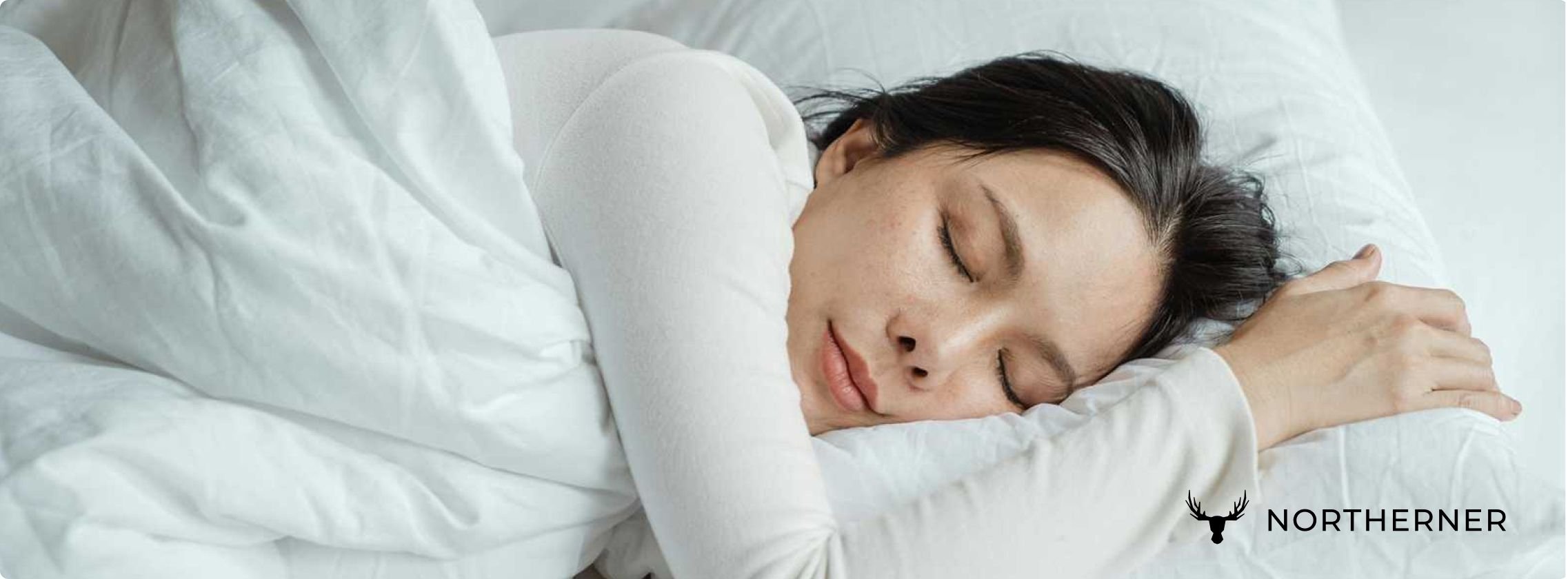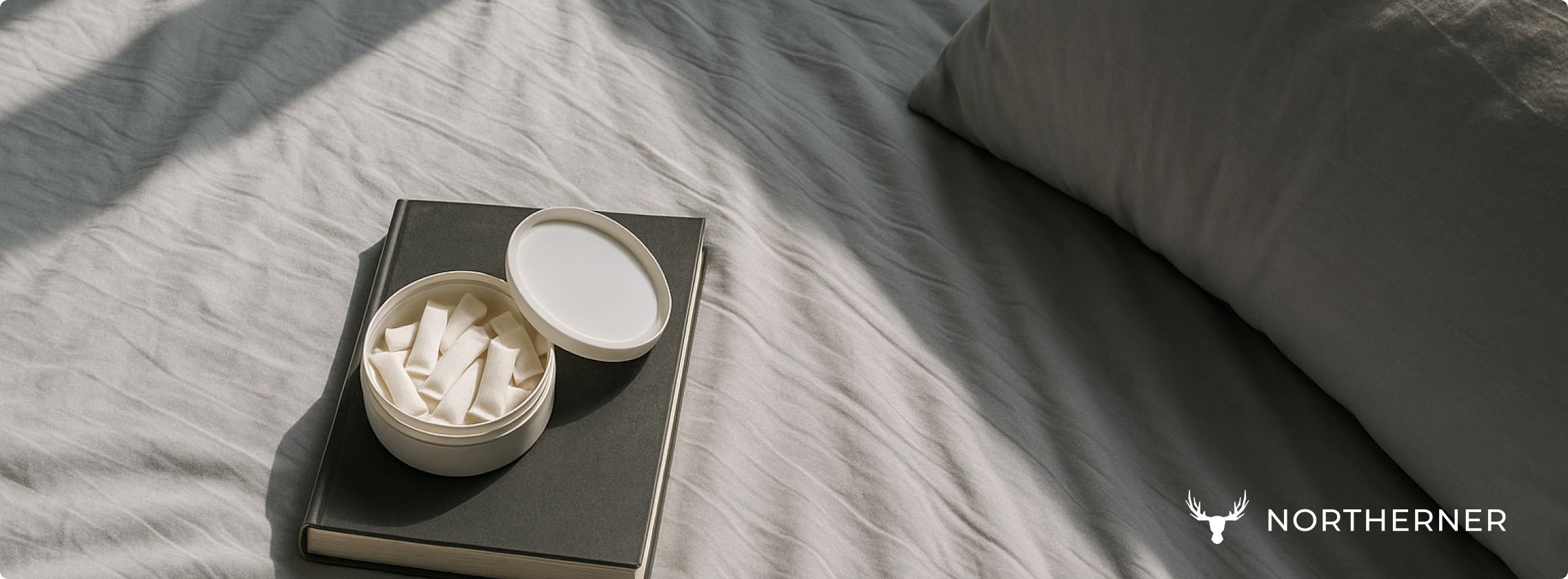Does Nicotine Affect Sleep?

Key Points
- Nicotine can affect sleep quality, especially when used too close to bedtime
- Sleep disruptions may include lighter sleep and more frequent awakenings
- Nicotine may affect cortisol levels, which play a role in your sleep-wake cycle
- Timing and nicotine strength are important factors to consider when using pouches
- Nicotine pouches are not intended for overnight use
Table of Contents
Nicotine: Just Like Caffeine?
Tobacco-free nicotine pouches are a discreet and smokeless alternative to traditional tobacco products.
As the name suggests, nicotine pouches deliver nicotine, a naturally occurring stimulant that may make you feel more alert or awake. Interestingly, nicotine can act as both a stimulant and a depressant (it is ‘biphasic’, meaning it has two distinct phases).1
Nicotine is often compared to caffeine, another stimulant, as they share some similarities:
- Both are plant-derived alkaloids*
- Both stimulate the central nervous system
- Both can influence feelings of mental sharpness and energy2
Thanks to these parallels, there’s increasing attention on how nicotine may affect the body and mind, especially when it comes to sleep.
*An alkaloid is a naturally occurring molecule that contains nitrogen atoms.
Does Nicotine Affect Sleep?
Several studies have highlighted a possible connection between nicotine use and disrupted sleep.
These studies tend to focus on smokers, rather than people who use nicotine in other forms.
However, because of the relationship between nicotine and cortisol, the body’s stress hormone, these findings may also be valuable for nicotine pouch users.
Sleep Disruption Among Smokers
Several studies suggest nicotine use among smokers may lead to sleep disruption, with symptoms such as:
- Increased difficulty falling asleep
- Less restful sleep
- More frequent awakenings during the night2,3
One study also found that individuals with existing insomnia symptoms experienced over 40 minutes less time asleep when using nicotine.4

Importantly, these disruptions are often linked not just to how long someone sleeps, but to sleep continuity–meaning, how deep and uninterrupted their sleep is.
For example, one study showed that smokers reported experiencing the same level of sleep quality as non-smokers. Yet sleep recordings revealed that the smokers actually woke up more often than they realised.3
What About Non-Smokers?
Most research into nicotine and sleep focuses on cigarette use. However, the findings may also be relevant for those using nicotine in other smokeless formats, including pouches.
This is because it is nicotine, rather than other substances in cigarettes, that may be a key factor influencing sleep. One article even refers to nicotine as “the primary cigarette component” that is associated with sleep disruption.2
How Cortisol Affects Our Circadian Rhythm–and Sleep
As a stimulant, nicotine is known to increase alertness and focus.
Research suggests that it may also affect the body’s stress system, known as the HPA axis. This system plays a key role in regulating cortisol levels, a hormone involved in wakefulness and sleep.5
Cortisol is known as the “stress hormone” and it follows a tightly regulated rhythm:
- It peaks in the morning (supporting wakefulness)
- It drops in the evening (promoting restful sleep)5
Disrupting this rhythm can contribute to sleep disturbances. Using nicotine later in the day may affect cortisol levels at a time when they would typically be winding down, which could then interfere with your body’s natural sleep-wake cycle.

Smokers, sleep, and cortisol
One study examined the relationship between smokers, sleep, and cortisol. It found that:
- Smokers had higher levels of cortisol
- They experienced more frequent awakenings during the night
- At the same time, higher cortisol levels were associated with fewer nighttime awakenings among smokers
- Plus, their ability to fall asleep and the time it took to do so was not significantly different to non-smokers3
So it’s still unclear exactly how cortisol affects sleep, especially as most studies focus on smokers rather than all nicotine users.
However, these findings do suggest that nicotine itself—whether smoked or used in other forms like nicotine pouches—may influence sleep in some individuals.
How Long Does Nicotine Keep You Awake?
The effects of nicotine pouches typically last between 20 and 60 minutes, depending on pouch strength and your individual tolerance.
Some users do report lingering effects even after removing the pouch.
One study found that using nicotine within four hours of bedtime was associated with more frequent awakenings and less restful sleep overall.4
So, while effects can vary, using your last pouch at least four hours before bedtime may help reduce potential sleep disturbances.
Nicotine Pouch Strengths and Night-Time Use
Some users find it helpful to opt for different nicotine pouch strengths throughout the day:
- Normal Strength (0-6 mg): Often suitable for lighter daytime use
- Strong (6.1-9 mg): Preferred by some users for the morning
- Extra Strong (9.1-20 mg): May be too stimulating for some users before bed
The stimulating effects of nicotine can vary depending on pouch strength and how close to bedtime it is used.
Some users prefer switching to lower-strength pouches in the hours before bedtime, or even avoiding nicotine use completely, to help minimise the chance of sleep disruption.
Find out more about available nicotine pouch strengths on our nicotine strengths page.
Can You Sleep With Snus In?
A common question. Many wonder if it’s a good idea to sleep with a nicotine pouch in.
Nicotine pouches are not intended for overnight use and prolonged exposure may lead to gum discomfort or irritation.

How Long Do Nicotine Pouches Stay in Your System?
Nicotine from a pouch typically remains detectable in the body for several hours. It may even last longer, depending on metabolism, frequency of use, and nicotine strength.
Can Nicotine Help You Sleep?
While nicotine is known to stimulate rather than sedate, some users report feeling more at ease after using a pouch at night.
This may be due to routine or ritual, but may also be a reflection of its biphasic (two-phase) nature.
However, there is currently no scientific evidence that supports using nicotine as a sleep aid. As this article discusses, using nicotine close to bedtime can actually hinder sleep.
Using Nicotine Pouches Before Bed
The following considerations may be helpful for adult pouch users experiencing sleep disruption.
- Avoid Extra Strong pouches in the evening
- Try to stop using nicotine at least 4 hours before sleep
- Pay attention to how your sleep feels with and without pouches
- Remove the pouch before going to bed
For more guidance on using nicotine pouches, visit our How to Use Snus page.
Final Thoughts: Managing Evening Nicotine Use
The effect of nicotine on sleep can vary depending on individual sensitivity, routine, and timing of use.
For those experiencing disrupted sleep, it may be worth looking over factors such as timing, pouch strength, and usage habits.
And even when sleep appears to be consistent, small adjustments to evening nicotine use could still influence overall rest quality.
Sleep and Nicotine Pouches FAQ
Does nicotine affect your sleep?
Nicotine can act as a stimulant, which may influence sleep in some individuals, particularly if used close to bedtime. For example, some individuals report lighter or more interrupted sleep when using nicotine pouches in the evening.
Does nicotine help you sleep?
There is currently no scientific evidence that supports using nicotine as a sleep aid.
Some users may report feeling more at ease when using nicotine before bed. This may be linked to routine or personal habit, but nicotine can also act as both a stimulant and a depressant.
How long do nicotine pouches stay in your system?
Nicotine can remain in your system for several hours, depending on factors like metabolism, body weight, and frequency of use. Some users also report lingering effects beyond this period.
How long does nicotine keep you awake?
The alertness caused by nicotine can vary. For many people, the effects of a pouch may last 20–60 minutes, but individual sensitivity and pouch strength can influence how long the effects last.
Is it okay to sleep with snus in your mouth?
Nicotine pouches are designed for short-term use, not overnight. Leaving a pouch in while you sleep may cause discomfort or prolonged exposure to nicotine.
Resources
- Nicotinic Receptor-mediated Biphasic Effect on Neuronal Excitability in Chick Lateral Spiriform Neurons. Ying-Bing Liu, Jian-Zhong Guo, and Vincent A Chiappinelli.
- Effects of Nicotine on the Central Nervous System and Sleep Quality in Relation to Other Stimulants: A Narrative Review. Nihaal Singh, Anil Wanjari, and Arya Harshyt Sinha.
- The Relationship Between Tobacco Smoking, Cortisol Secretion, and Sleep Continuity. Ami Cohen, Raul Colodner, Rifat Masalha, and Iris Haimov.
- Evening intake of alcohol, caffeine, and nicotine: night-to-night associations with sleep duration and continuity among African Americans in the Jackson Heart Sleep Study. Christine E Spadola, Na Guo, Dayna A Johnson et al.
- Replication of cortisol circadian rhythm: new advances in hydrocortisone replacement therapy. Sharon Chan and Miguel Debono.
